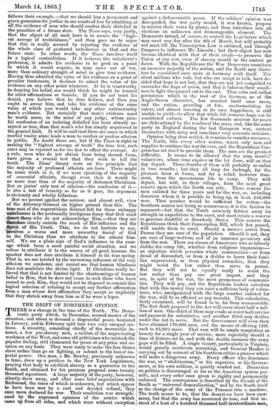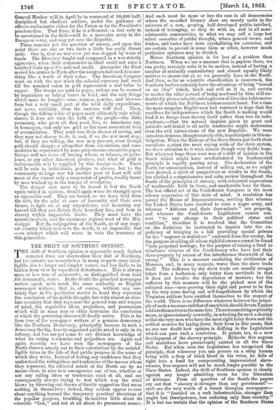THE DRIFT OF NORTHERN OPINION.
THERE is a change in the tone of the North. The Demo- cratic party which, in December, seemed master of the situation, and about to demand a disgraceful peace, hesitated in January, and in February split into two very unequal sec- tions. A minority, consisting chiefly of the mercantile in- terest, a few pro-slavery men, a section of the negro-hating workmen of the West, and some old politicians who mistook the popular feeling, still clamoured for peace at any price and re- union on any basis. They were ready to make the free States slave rather than go on fighting, or submit to the loss of im- perial power. One man, a Mr. Bewley, previously unknown to fame, drew up a petition to the New York Legislature, praying that body to establish slavery as a guarantee to the South, and obtained for his precious proposal some twenty thousand signatures. A large majority of' the party, however, silently drew away, and after some brief negotiations with Richmond, the tenor of which is unknown, but which appear to have been met by a curt and decided refusal, they once more declared for war. Their resolution was strength- ened by the expressed opinions of the armies which came up from all sides, and which were without exception against a dishonourable peace. If the soldiers' opinion was disregarded, the war party would, it was known, propose to receive their votes by proxy, and thus introduce into all elections an unknown and unmanageable element. The Democrats intend, of course, to control the Legislature which may meet any day after the 4th of March, but will probably not meet till the Conscription Law is enforced, and through Congress to influence Mr. Lincoln ; but their object has now become identical with that of their rivals—to preserve the Union at any cost, even if slavery should in the contest go down. With the Republicans the War Democrats constitute an immense majority of the nation, and the North may there- fore be considered once more at harmony with itself. The silent millions who rule, but who are unapt to talk, have de- cided that hope is not lost, that they are not yet compelled to surrender the hope of union, and that it behoves their manli- ness to fight the quarrel out to the end. That calm and sullen persistence which is the root of the German, as of the Anglo-Saxon character, has asserted itself once more, and the nation, growling at fate, anathematizing its rulers, and almost sneering at its own doggedness, is still unable to yield—to allow that while life' remains hope can be considered extinct. The few thousands anxious for peace are disheartened by the resolve of the mass, and, like the same party in England during the last European war, content themselves with noisy and sometimes very sarcastic criticism. Opinion being thus settled, it remains to consider resources. The North, like every other nation, wants only men and supplies to continue the war for ever, and the Republican Con- gress has set itself to provide them. The men are the greatest difficulty. It seems to be allowed that the nine months' volunteers, whose time expires on the 1st June, will on that day depart. Three-fourths of them will probably re-enlist in two months ; but they all long for furlough, for the pleasant faces at home, and for a relief, however tran- sient, from the monotonous life in camp. They will depart, but will, in their villages, form the next great reserve upon which the North can rely. There remain the men enlisted for three years and for the war, or, including deserters whom it is possible to bring up, at least 250,000 men. That number would be sufficient for action—the Southern armies not being so numerous as it is the fashion to represent—but that the North unwisely fritters away its strength in expeditions to the coast, and must retain a reserve to garrison doubtful or disorderly States. This reserve the Republicans think their Conscription Bill, which has passed, will enable them to enrol. Should a menace arrive from France they are sure of the population. Should it not, they are sure of large sections, and of an immense pecuniary aid from the rest. There are classes of Americans who so bitterly dislike the camp life, whether from religions impressions— an objection which pervades whole communities—or from dread of discomfort, or from a dislike to leave their fami- lies unprotected, or from physical cowardice, that they might resist the law rather than serve in person. But they will not be equally ready to resist the law rather than pay one great impost, and they are, in spite of the war, the most prosperous of communi- ties. They will pay, and the Republican leaders calculate that with this money they can raise a sufficient body of volun- teers, who, amalgamated with the large number enlisted for the war, will be as efficient as any recruits. This calculation, fairly examined, will be found to be far from unreasonable. The first draft proposed in the Act will cover about half a mil- lion of men. One-third of these may evade or resist both service and payment for substitutes, and another third may decline under the Act to serve. But the Government will even then have obtained 170,000 men, and the means of offering 1201. each to 85,003 more. That sum will be ample temptation as bounty for a single year of service, more especially should a time of distress set in, and with the double resource the army gaps will be filled. A single victory, particularly in Virginia, would greatly accelerate recruiting, and General Hooker is carrying out by consent of his Southern critics a process which will make a dangerous army. Every officer who denounces the war, or "abolitionism," or his superiors, or his Govern- ment, or his own soldiers, is quietly weeded out. Discussion on politics is discouraged as far as the American system per- mits, and every order once given is rigidly and permanently enforced. The consequence is described by the friends of the South as "universal demoralization," and by the South itself as the change of the army of the Potomac into a machine. The truth seems to be, that the desertions have been enor- mous, but that the army has recovered its tone, and that in- stead of a host of a hundred thousand half-insubordinate men, General Hooker will in April be in command of 50,000 half- disciplined but obedient soldiers, under the guidance of officers enthusiastic either for the Union or for the President's proclamation. That force, if he is a General—a fact only to be ascertained in the field—will be a moveable army in the European sense, and may yet save the Republic. There remains yet the question of money, and upon this point there are one or two facts a little too easily thrust aside. One is, that no war ever yet was stopped by want of funds. The Directory fought and conquered in a war strictly aggressive, when their commander-in-chief could not raise a hundred louis upon the national credit. Alexander the First moved his armies to Paris after the assign ats had sunk to some- thing like a tenth of their value. The American Congress went on with the war when the colouial currency had sunk till the nominal value in gold represented a real value in copper. The troops are paid in paper, rations can be secured by requisition or taking taxes in kind, and the only things which must be bought— arms, cannon, powder, and shoes— form but a very small part of the total daily expenditure, not more, certainly, than the customs will feed. Then, though the falling value of paper must ultimately ruin whole classes, it does not ruin the bulk of the people—the little yeomanry, who grow all they need, live, as Americans say, in homespun, and only use gold as the most couvenient form of accumulation. They must lose their chance of saving, and they may not choose to do it, and, if so, the war must stop ; but, if they are willing, the war may proceed, even though gold should disappear altogether from circulation, and com- modities he represented by some preposterous amount in paper. Europe will not leave off buying wheat, or tobacco, or petro- leum, or any other American produce, and what of gold is indispensable will be supplied by this foreign trade. There will be ruin to individuals, perhaps to classes, but to the community at large war for another year at least will still mean at the utmost only a suspension of profits, readily borne by men worked up to the temper of revolution.
The danger now most to be feared is lest the North again united in opinion, should again waste its strength upon an impossible end. They are bound, as we have held from the first, for the sake at once of humanity and their own future, to fight on at any expenditure, and incurring any hazard till they can dictate their boundary line, and hem in slavery within impassable limits. They must have the mountain-chain, and the enormous regions west of the Mis- sissippi. But the subjugation of the South, as of any tropi- cal country which resists to the death, is an impossible feat —an attempt which will waste in vain the resources of this generation.































 Previous page
Previous page